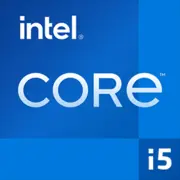Intel Core i5-14400

The Intel Core i5-14400 processor is a solid addition to the Intel lineup, offering impressive performance and efficiency for desktop users. With its Raptor Lake Refresh code name and Intel 7 technology, this CPU boasts 10 cores and 16 threads, making it a great option for multitasking and demanding applications.
The base frequency of 2.5 GHz and max turbo frequency of 4.7 GHz provide ample power for a wide range of tasks, from everyday computing to gaming and content creation. The 20MB L3 cache helps to further enhance performance, while the 65W TDP keeps power consumption in check.
One standout feature of the i5-14400 is its integrated graphics, offering decent visuals without the need for a separate GPU. This makes it a great option for budget-conscious builds or smaller form factor systems.
In terms of real-world performance, the i5-14400 shines in both single core and multi-core tasks, as evidenced by its Geekbench 6 scores of 2608 and 13394 respectively.
Overall, the Intel Core i5-14400 is a compelling choice for those in need of a reliable and efficient desktop processor, offering strong performance and value for a wide range of computing needs.
Basic
Label Name
Intel
Platform
Desktop
Launch Date
January 2024
Model Name
?
The Intel processor number is just one of several factors - along with processor brand, system configurations, and system-level benchmarks - to be considered when choosing the right processor for your computing needs.
i5-14400
Code Name
Raptor Lake Refresh
CPU Specifications
Total Cores
?
Cores is a hardware term that describes the number of independent central processing units in a single computing component (die or chip).
10
Total Threads
?
Where applicable, Intel® Hyper-Threading Technology is only available on Performance-cores.
16
Performance-cores
6
Efficient-cores
4
Performance-core Base Frequency
2.5 GHz
Efficient-core Base Frequency
1.8 GHz
Performance-core Max Turbo Frequency
?
Maximum P-core turbo frequency derived from Intel® Turbo Boost Technology.
4.7 GHz
L1 Cache
80K per core
L2 Cache
2MB per core
L3 Cache
20MB shared
CPU Socket
?
The socket is the component that provides the mechanical and electrical connections between the processor and motherboard.
LGA-1700
Technology
?
Lithography refers to the semiconductor technology used to manufacture an integrated circuit, and is reported in nanometer (nm), indicative of the size of features built on the semiconductor.
Intel 7
TDP
65 W
Max. Operating Temperature
?
Junction Temperature is the maximum temperature allowed at the processor die.
100°C
Memory Specifications
Memory Type
?
Intel® processors come in four different types: Single Channel, Dual Channel, Triple Channel, and Flex Mode. Maximum supported memory speed may be lower when populating multiple DIMMs per channel on products that support multiple memory channels.
DDR5-6000
Max Memory Size
?
Max memory size refers to the maximum memory capacity supported by the processor.
128GB
Memory Channels
?
The number of memory channels refers to the bandwidth operation for real world application.
2
GPU Specifications
Integrated Graphics Model
?
An integrated GPU refers to the graphics core that is integrated into the CPU processor. Leveraging the processor's powerful computational capabilities and intelligent power efficiency management, it delivers outstanding graphics performance and a smooth application experience at a lower power consumption.
True
Benchmarks
Cinebench R23
Single Core
Score
1835
Cinebench R23
Multi Core
Score
18920
Geekbench 6
Single Core
Score
2608
Geekbench 6
Multi Core
Score
13394
Geekbench 5
Single Core
Score
1656
Geekbench 5
Multi Core
Score
10770
Passmark CPU
Single Core
Score
3790
Passmark CPU
Multi Core
Score
26855
Compared to Other CPU
Cinebench R23 Single Core
Cinebench R23 Multi Core
Geekbench 6 Single Core
Geekbench 6 Multi Core
Geekbench 5 Single Core
Geekbench 5 Multi Core
Passmark CPU Single Core
Passmark CPU Multi Core
Related CPU Comparisons
Share in social media
Or Link To Us
<a href="https://cputronic.com/cpu/intel-core-i5-14400" target="_blank">Intel Core i5-14400</a>




